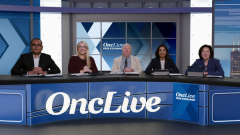
HR+ BC: Is There Still a Role for Everolimus Post–Endocrine Therapy?
Panelists briefly consider the ongoing role of everolimus in relapsed/refractory HR+/HER2- breast cancer given recent shifts in the treatment paradigm.
Episodes in this series

Transcript:
Hope S. Rugo, MD, FASCO: We don’t want to abandon our older drugs, right? I’m going to ask you 2 things. One, is there still a role for everolimus and how would you put that into your sort of schema, sequencing of treatment? And two, what do you think about the SERDs [selective estrogen receptor downregulators]? You heard about the update subsets in the EMERALD, and then 2 trials which haven’t been reported publicly have press releases saying they weren’t better than the treatment of physician choice endocrine therapy.
Anne O’Dea, MD: The first question about everolimus—it’s certainly a tool in our arsenal; it’s something that we need to remember for selected patients who for whatever reason maybe haven’t tolerated CDK4/6 or some other endocrine therapies. It’s hard to imagine now if we look at time to progression post CDK4/6 with everolimus, it’s really not very good. Therefore, it’s hard to imagine a scenario in the era of PIK3CA inhibitors and the era of antibody drug conjugates for HER2 low also in this space. It’s very hard to imagine a very large use for everolimus, although certainly I have patients who really prefer being on that oral agent for whatever reason and want to give an oral-targeted agent 1 more try before they move forward into potential intravenous therapeutic options.
Hope S. Rugo, MD, FASCO: A lot of the trials actually that are being planned, including trials with elacestrant, will have arms combined with everolimus. Elacestrant, giredestrant [ph] has one. I know Avera [ph], it’s called? There are some others, too, who don’t have a PIK3CA mutation, right? Are you still using everolimus in clinical practice?
Mark Pegram, MD: Of course, yes, at least in 2022. That’s another line of endocrine therapy. They can install the need for cytotoxic chemotherapy and its associated [adverse] effects. I wonder what’s going to happen in the ADC [antibody-drug conjugates] era. The ADC trials, though, are patient populations that have had some prior chemo already; it probably can’t replace another line of hormone therapy.
Hope S. Rugo, MD, FASCO: They’re generally better tolerated, yes. Although for some, maybe not. I don’t know for sure.
Transcript edited for clarity.








































